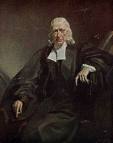Who Said That?
 Friday, August 8, 2008 at 10:28AM
Friday, August 8, 2008 at 10:28AM  "This then, is a plain proof that the doctrine of predestination is
not a doctrine of God, because it makes void the ordinance of God; and
God is not divided against himself.
"This then, is a plain proof that the doctrine of predestination is
not a doctrine of God, because it makes void the ordinance of God; and
God is not divided against himself.
[The doctrine of Predestination] directly tends to destroy that holiness which is the end of all the ordinances of God. I do not say, none who hold it are holy; (for God is of tender mercy to those who are unavoidably entangled in errors of any kind;) but that the doctrine itself, -- that every man is either elected or not elected from eternity, and that the one must inevitably be saved, and the other inevitably damned, -- has a manifest tendency to destroy holiness in general; for it wholly takes away those first motives to follow after it, so frequently proposed in Scripture, the hope of future reward and fear of punishment, the hope of heaven and fear of hell."
OK, who said that? Leave your guess in the comments section below. No google searches or cheating!
 Kim Riddlebarger
Kim Riddlebarger
 As many of you correctly guessed, this comes from John Wesley's famous sermon "On Free Grace," (1740).
As many of you correctly guessed, this comes from John Wesley's famous sermon "On Free Grace," (1740).


Reader Comments (41)
I was going to say Wesley on a bad day or Finney on a good one, but on reflection, I'll simply guess at Finney.
Wesley.
The Book of Concord gives the most Biblical treatment of election.
What does differ among various Christian denominations, however, the KIND of election and to WHAT is one predestined. From reading this blog and other religious material, I get the impression that the Reformed belief (Calvinistic) is a dual predestination where one is elected from before eternity by an omniscient God either to salvation or to damnation. Beliefs at the Armenian belief seems to be more vague and evasive about whether or not one is even predestined at all and that anyone can move ones self into a state of salvation by doing the right things and believing the right things.
Stuck in the middle are the Lutherans, who certainly subscribe to the concepts of election and predestination, but only that God has chosen some for salvation, not for damnation. It is a paradox. Reformed insist on solving the paradox by using "either/or" logic; Evangelicals ignore the paradox; and Lutherans accept the paradox as a mysterious concept that can only be understood by God, not by humans.
To that end, the above quote almost sounds like something from Luther, except for all of the rhetoric about "holiness."
Even after you mentioned it during the second service a few months ago, I am still astounded.